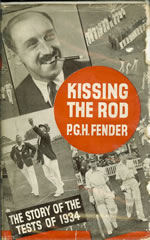Kissing the Rod
Archie Mac |Published: 1934
Pages: 164
Author: Fender, Percy
Publisher: Chapman & Hall
Rating: 4 stars

John Arlott writing on Fender’s coverage of Ashes series, wrote his accounts ‘were as precise in their reporting and as keenly and objectively analytical as any ever written.’* And Fender’s books were almost exclusively about the cricket played and not about the off field shenanigans or hedonistic escapades of the combatants. When requested to report on the after play doings of one of the Australians during the 1934 tour – most likely Fleetwood-Smith – Fender snapped ‘you employed me to write cricket.’*
‘Kissing The Rod’ deals with the Australian tour of England in 1934, and at the time this tour was shrouded in controversy. Following the aftermath of the Bodyline series three of England’s most influential players of that most infamous series were lost to the Tests of 1934 despite the series taking place just 18 months later.
The Bodyline captain Douglas Jardine, whether jumping or being pushed, announced that he neither had the inclination or the desire to captain England during the series. Harold Larwood, after a combination of refusing to apologise and having a bone removed from his foot was also out, and Bill Voce, Larwood’s fast bowling partner in crime apart from giving the Australians one final taste of Bodyline and then developing a mystery injury in the Notts match against the tourists took no part in the series.
It has always been a great disappointment that Fender did not cover the Bodyline series, with his newspaper The Star preferring to send the recently retired cricket legend but ultra nice Jack Hobbs to cover the series with his ghost writer in tow. Fender did not like the term Bodyline and preferred the title Fast Leg Theory, and in the introduction to ‘Kissing The Rod’ Fender makes his opinions on how the Australians played Bodyline and how the Australian Board of Control handled the situation plain.
Fender was well ahead of his time; when everyone else was concerned with time, Fender kept his own scorecards and recorded balls faced, and provides run-rates to compare scoring rates. This was particularly relevant in 1934 as the Test matches were only of four days duration, except to the last which was played to a finish to decide the rubber.
Fender’s claims that England were denied their best bowlers – especially fast bowlers – was confirmed when Bill Ponsford who had always struggled with extreme pace matched the great Bradman in this series to give the Australians the series by 2-1.
England’s only victory had been ‘Verity’s match’ when he destroyed Australia at Lords which until 2009 was their last victory at the home of cricket.
The title of the book ‘Kissing The Rod’ means to submit to corporal punishment. Perhaps Fender was making a point about with the loss of Jardine and Larwood? It may well have been aptly called ‘Removing The Appendicitis’ after McCabe for Australia and Gubby Allen for England had their appendix removed before the start of the series and Don Bradman who almost died when his burst, at the end of the series.
Fender has often been described as the greatest English captain never to captain England, and once you have read this book you to will wonder why he never received the nod.
*based on passages from P.G.H. Fender a biography by Richard Streeton






Leave a comment